AWM41 1065 - [Nurses Narratives] Sister Louise E Young - Part 2
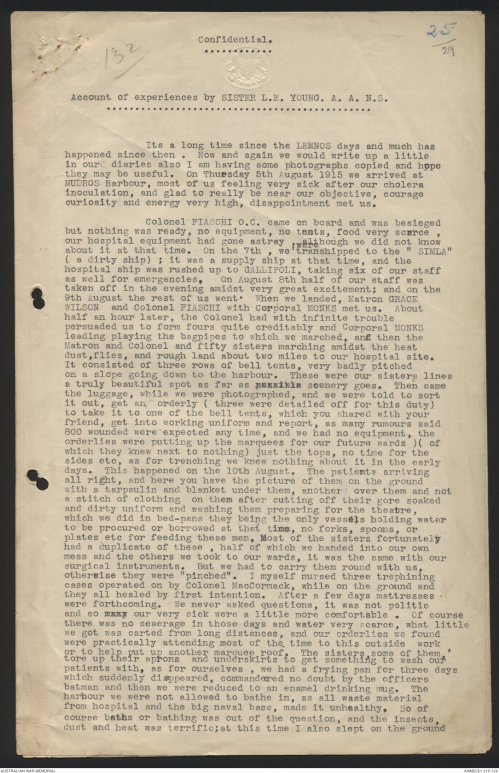
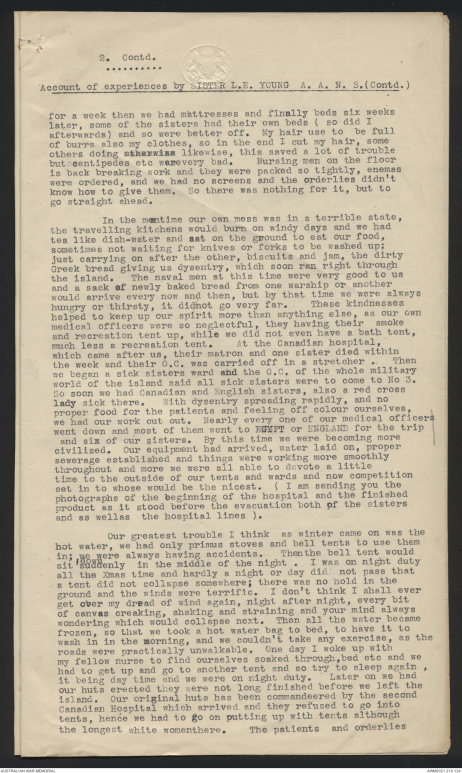
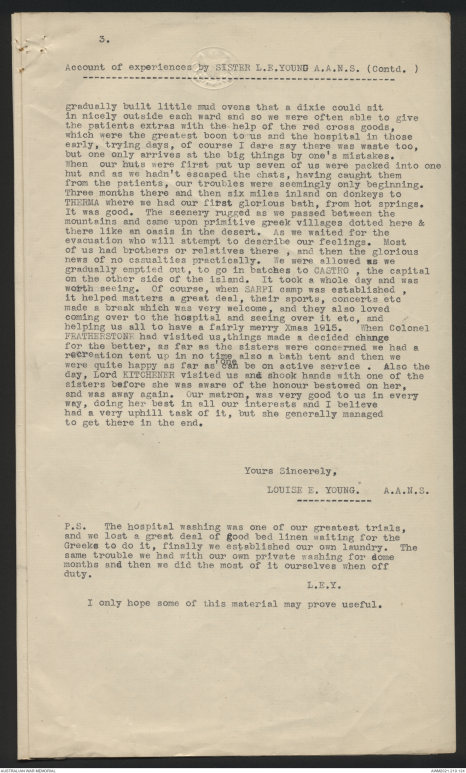
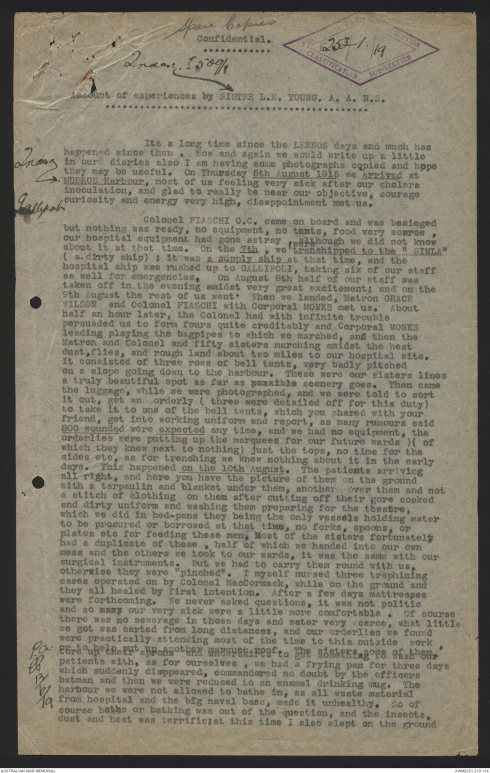
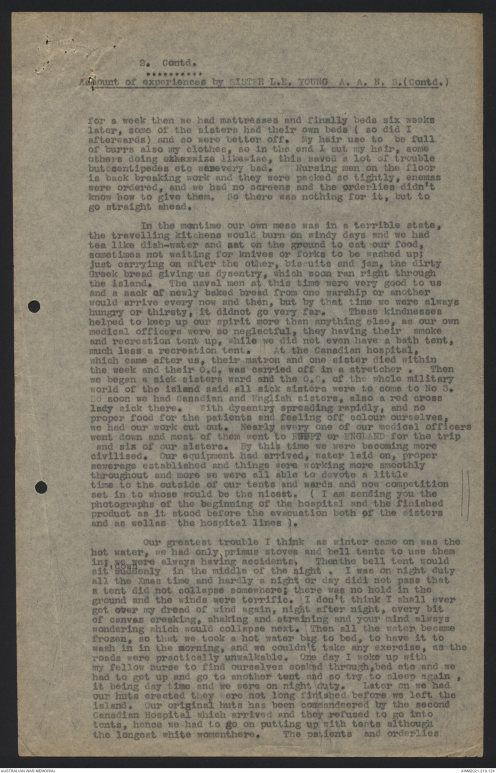
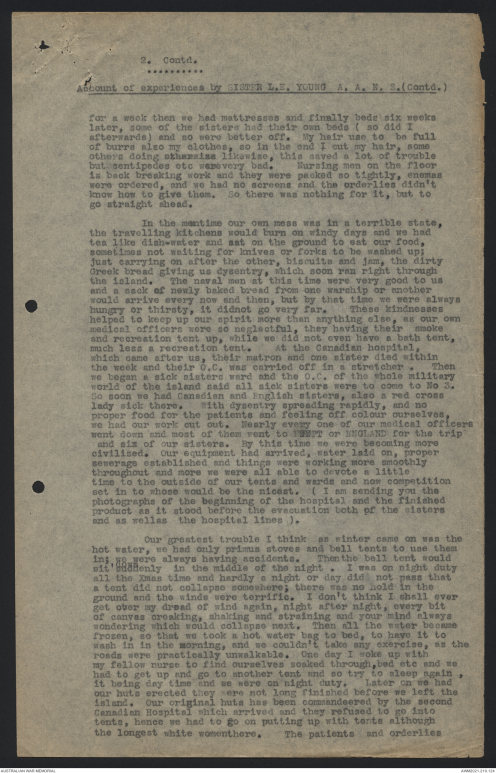
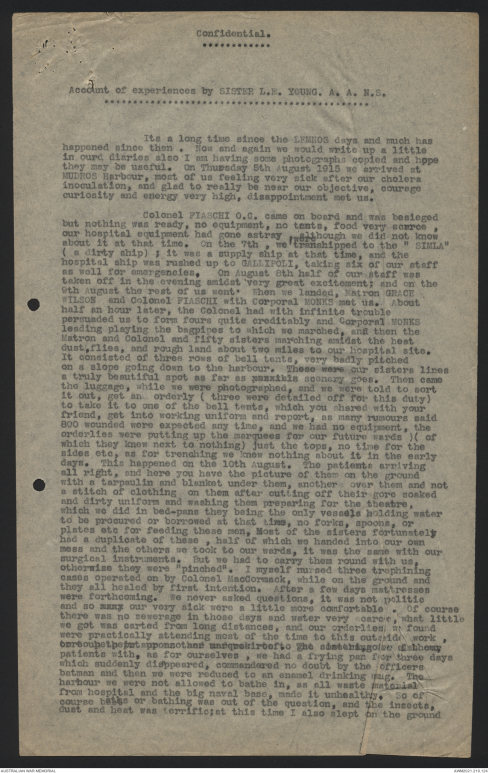
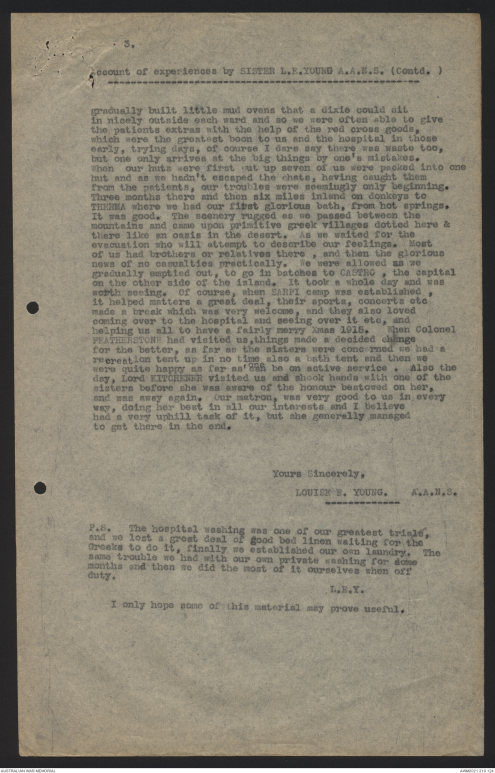
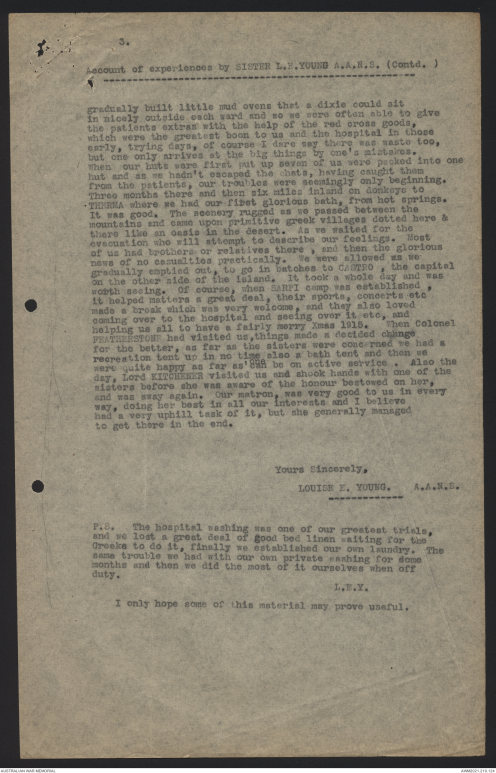
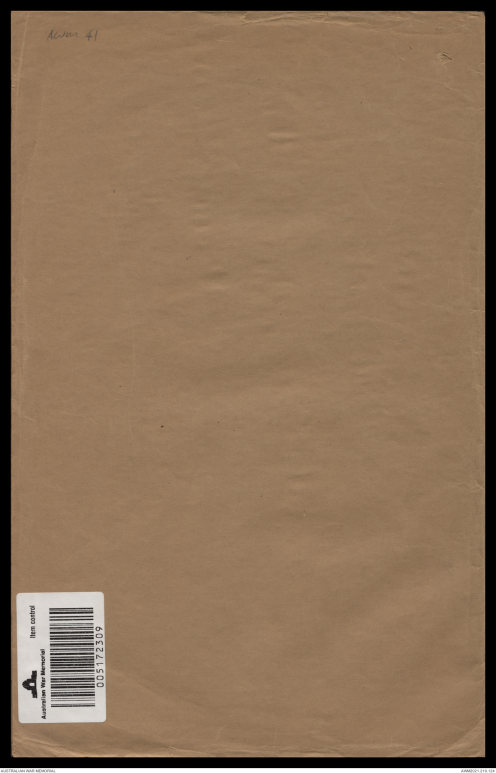
25/29
Confidential.
132
Account of experience by SISTER L.E. YOUNG. A. A.N.S
Its a long time since the LEMNOS days and much has
happened since then. Now and again we would write up a little
in our diaries also I am having some photographs copied and hpope
they may be useful. On Thursday 5th August 1915 we arrived at
MUDROS Harbour, most of us feeling very sick after our cholera
inoculation, and glad to really be near our objective, courage
curiosity and energy very high, disappointment met us.
Colonel FIASCHI O.C. came on board and was besieged
but nothing was ready, no equipment, no tents, food very scarce,
our hospital equipment had gone astray although we did not know
about it at that time. On the 7th, we ^were transhipped to the "SIMLA"
(a dirty ship); it was a supply ship at that time, and the
hospital ship was rushed up to GALLIPOLI, taking six of our staff
as well for emergencies. On August 8th half of our staff was
taken off in the evening amidst very great excitement; and on the
9th August the rest of us went. When we landed, Matron GRACE
WILSON and Colonel FIASCHI with Corporal MONKS met us. About
half an hour later, the Colonel had with infinite trouble
persuaded us to form fours quite creditably and Corporal MONKS
leading playing the bagpipes to which we marched, and then the
Matron and Colonel and fifty sisters marching amidst the heat
dust,flies, and rough land about two miles to our hospital site.
It consisted of three rows of bell tents, very badly pitched
on a slope going down to the harbour. These were our sisters lines
a truly beautiful spot as far as possible scenery goes. Then came
the luggage, while we were photographed, and we were told to sort
it out, get an orderly (three were detailed off for this duty)
to take it to one of the bell tents which you shared with your
friend, get into working uniform and report, as many rumours said
800 wounded were expected at any time, and we had no equipment, the
orderlies were putting up the marquees for our future wards )( of
which they knew next to nothing) just the tops, no time for the
sides etc, as for trenching we knew nothing about it in the early
days. This happened on 10th August. The patients arriving
all right, and here you have the picture of them on the ground
with a tarpaulin and blanket under them, another over them and not
a stitch of clothing on them after cutting of their gore soaked
and dirty uniform and washing them preparing for the theatre,
which we did in bed-pans they being the only vessels holding water
to be procured or borrowed at that time, no forks, spoons, or
plates etc for feeding these men. Most of the sisters fortunately
had a duplicate of these, half of which we handed into our own
mess and the others we took to our wards, it was the same with our
surgical instruments. But we had to carry them round with us,
otherwise they were "pinched". I myself nursed three trephining
cases operated on by Colonel MacCormack, while on the ground and
they all healed by first intention. After a few days mattresses
were forthcoming. We never asked questions, it was not politic
and so many our very sick were a little more comfortable. Of course
there was no sewerage in those days and water very scarce, what little
we got was carted from long distances, and our orderlies we found
were practically attending most of the time to this outside work
or to help put up another marquee roof. The sisters, some of them,
tore up their aprons and underskirts to get something to wash our
patients with, as for ourselves, we had a frying pan for three days
which suddenly disppeared, commandeered no doubt by the officers
batman and then we were reduced to an enamel drinking mug. The
harbour we were not allowed to bathe in, as all waste material
from hospital and the big naval base, made it unhealthy. So of
course baths or bathing was out of the question, and the insects,
dust and heat was terrific; at this time I also slept on the ground
2. Contd.
Account of experiences by SISTER L.E. YOUNG A. A. N. S.(Contd.)
for a week then we had mattresses and finally beds six weeks
later, some of the sisters had their own beds ( so did I
afterwards ) and so were better off. My hair use to be full
of burrs also my clothes, so in the end I cut my hair, some
others doing otherwise likewise, this saved a lot of trouble
but centipedes etc were very bad. Nursing men on the floor
is back breaking work and they were packed so tightly, enemas
were ordered, and we had no screens and the orderlies didn't
know how to give them. So there was nothing for it, but to
go straight ahead.
In the meantime our own mess was in a terrible state,
the travelling kitchens would burn on windy days and we had
tea like dish-water and sat on the ground to eat our food,
sometimes not waiting for knives or forks to be washed up;
just carrying on after the other, biscuits and jam, the dirty
Greek bread giving us dysentry, which soon ran right through
the island. The naval men at this time were very good to us
and a sack of newly baked bread from one warship or another
would arrive every now and then but by that time we were always
hungry or thirsty, it did/not go very far. These kindnesses
helped to keep up our spirit more than anything else, as our own
medical officers were so neglectful, they having their smoke
and recreation tent up, while we did not even have a bath tent,
much less a recreation tent. At the Canadian hospital,
which came after us, their matron and one sister died within
the week and their O.C. was carried off in a stretcher. Then
we began a sick sisters ward and the O.C of the whole military
world of the island said all sick sisters were to come to No 3.
So soon we had Canadian and English sisters, also a red cross
lady sick there. With dysentry spreading rapidly, and no
proper food for the patients and feeling off colour ourselves,
we had our work cut out. Nearly every one of our medical officers
went down and most of them went to EGYPT or ENGLAND for the trip
and six of our sisters. By this time we were becoming more
civilised. Our equipment had arrived, water laid on, proper
sewerage established and things were working more smoothly
throughout and more we were all able to devote a little
time to the outside of our tents and wards and now competition
set in to whose would be the nicest. (I am sending you the
photographs of the beginning of the hospital and the finished
product as it stood before the evacuation both pof the sisters
and as wellas the hospital lines).
Our greatest trouble I think as winter came on was the
hot water, we had only primus stoves and bell tents to use them
in; we were always having accidents. Then the bell tent would
sit ^down suddenly in the middle of the night. I was on night duty
all the Xmas time and hardly a night or day did not pass that
a tent did not collapse somewhere; there was no hold in the
ground and the winds were terrific. I don't think I shall ever
get over my dread of wind again, night after night, every bit
of canvas creaking, shaking and straining and your mind always
wondering which would collapse next. Then all the water became
frozen, so that we took a hot water bag to bed, to have it to
wash in in the morning, and we couldn't take any exercise, as the
roads were practically unwalkable. One day I woke up with
my fellow nurse to find ourselves soaked through, bed etc and we
had to get up and go to another tent and so try to sleep again,
it being day time and we were on night duty. Later on we had
our huts erected they were not long finished before we left the
island. Our original huts has been commandeered by the second
Canadian Hospital which arrived and they refused to go into
tents, hence we had to fgo on putting up with tents although
the longest white womenthere. The patients and orderlies
3.
Account of experiences by SISTER L.E. YOUNG A. A. N. S.(Contd.)
gradually built little mud ovens that a dixie could sit
in nicely outside each ward and so we were often able to give
the patients extras with the help of the red cross goods,
which were the greatest boon to us and the hospital in those
early, trying days, of course I dare say there was waste too,
but one only arrives at the big things by one's mistakes.
When our huts were first put up seven of us were packed into one
hut and as we hadn't escaped the chats, having caught them
from the patients, out troubles were seemingly only beginning.
Three months there and then six miles inland on donkeys to
THERMA where we had our first glorious bath, from hot springs.
It was good. The scenery rugged as we passed between the
mountains and came upon primitive greek villages dotted here &
there like an oasis in the desert. As we waited for the
evacuation who will attempt to describe our feelings. Most
of us had brothers or relatives there, and then the glorious
news of no casualties practically. We were allowed as we
gradually emptied out, to go in batches to CASTRO, the capital
on the other side of the island. It took a whole day and was
worth seeing. Of course, when SARPI camp was established,
it helped matters a great deal, their sports, concerts etc
made a break which was very welcome, and they also loved
coming over to the hospital and seeing over it etc, and
helping us all to have a fairly merry Xmas 1915. When Colonel
FEATHERSTONE had visited us, things made a decided change
for the better, as far as the sisters were concerned we had a
recreation tent up in no time also a bath tent and then we
were quite happy as far as ^one can be on active service. Also the
day, Lord KITCHENER visited us and shook hands with one of the
sisters before she was aware of the honour bestowed on her,
and was away again. Our matron, was very good to us in every
way, doing her best in all our interests and I believe
had a very uphill task of it, but she generally managed
to get there in the end.
Yours sincerely,
LOUISE E. YOUNG A.A.N.S.
P.S. The hospital washing was one of our greatest trials,
and we lost a great deal of good bed linen waiting for the
Greeks to do it, finally we established our own laundry. The
same trouble we had with our own private washing for some
months and then we did the most of it ourselves when off
duty.
L.E.Y.
I only hope some of this material may prove useful.
Spare Copies
Confidential.
253 1.19
2nd inst. G509/1
Account of experience by SISTER L.E. YOUNG. A. A. N.S
Its a long time since the LEMNOS days and much has
happened since then. Now and again we would write up a little
in our diaries also I am having some photographs copied and hope
they may be useful. On Thursday 5th August 1915 we arrived at
[*Index*] MUDROS Harbour, most of us feeling very sick after our cholera
inoculation, and glad to really be near our objective, courage
curiosity and energy very high, disappointment met us.
[*Gallipoli*]
Colonel FIASCHI O.C. came on board and was besieged
but nothing was ready, no equipment, no tents, food very scarce,
our hospital equipment had gone astray although we did not know
about it at that time. On the 7th, we ^were transhipped to the "SIMLA"
(a dirty ship); it was a supply ship at that time, and the
hospital ship was rushed up to GALLIPOLI, taking six of our staff
as well for emergencies. On August 8th half of our staff was
taken off in the evening amidst very great excitement; and on the
9th August the rest of us went. When we landed, Matron GRACE
WILSON and Colonel FIASCHI with Corporal MONKS met us. About
half an hour later, the Colonel had with infinite trouble
persuaded us to form fours quite creditably and Corporal MONKS
leading playing the bagpipes to which we marched, and then the
Matron and Colonel and fifty sisters marching amidst the heat
dust, flies, and rough land about two miles to our hospital site.
It consisted of three rows of bell tents, very badly pitched
on a slope going down to the harbour. These were our sisters lines
a truly beautiful spot as far as possible scenery goes. Then came
the luggage, while we were photographed, and we were told to sort
it out, get an orderly (three were detailed off for this duty)
to take it to one of the bell tents which you shared with your
friend, get into working uniform and report, as many rumours said
800 wounded were expected at any time, and we had no equipment, the
orderlies were putting up the marquees for our future wards)(of
which they knew next to nothing) just the tops, no time for the
sides etc, as for trenching we knew nothing about it in the early
days. This happened on the 10th August. The patients arriving
all right, and here you have the picture of them on the ground
with a tarpaulin and blanket under them, another over them and not
a stitch of clothing on them after cutting off their gore soaked
and dirty uniform and washing them preparing for the theatre,
which we did in bed-pans they being the only vessels holding water
to be procured or borrowed at that time, no forks, spoons, or
plates etc for feeding these men. Most of the sisters fortunately
had a duplicate of these, half of which we handed into our own
mess and the others we took to our wards, it was the same with our
surgical instruments. But we had to carry them round with us,
otherwise they were "pinched". I myself nursed three trephining
cases operated on by Colonel MacCormack, while on the ground and
they all healed by first intention. After a few days mattresses
were forthcoming. We never asked questions, it was not politic
and so many our very sick were a little more comfortable. Of course
there was no sewerage in those days and water very scarce, what little
we got was carted from long distances, and our orderlies we found
were practically attending most of the time to this outside work
[*P.a.
CB
13/6/19*]
or to help put up another marquee roof. The sisters, some of them,
tore up their aprons and underskirts to get something to wash our
patients with, as for ourselves, we had a frying pan for three days
which suddenly disappeared, commandeered no doubt by the officers
batman and then we were reduced to an enamel drinking mug. The
harbour we were not allowed to bathe in, as all waste material
from hospital and the big naval base, made it unhealthy. So of
course baths or bathing was out of the question, and the insects,
dust and heat was terrific; at this time I also slept on the ground
2. Contd.
Account of experiences by SISTER L.E. YOUNG A. A. N. S.(Contd.)
for a week then we had mattresses and finally beds six weeks
later, some of the sisters had their own beds (so did I
afterwards) and so were better off. My hair use to be full
of burrs also my clothes, so in the end I cut my hair, some
others doing otherwise likewise, this saved a lot of trouble
but centipedes etc were very bad. Nursing men on the floor
is back breaking work and they were packed so tightly, enemas
were ordered, and we had no screens and the orderlies didn't
know now to give them. So there was nothing for it, but to
go straight ahead.
In the meantime our own mess was in a terrible state,
the travelling kitchens would burn on windy days and we had
tea like dish-water and sat on the ground to eat our food,
sometimes not waiting for knives or forks to be washed up;
just carrying on after the other, biscuits and jam, the dirty
Greek bread giving us dysentry, which soon ran right through
the island. The naval men at this time were very good to us
and a sack of newly baked bread from one warship or another
would arrive every now and then but by that time we were always
hungry or thirsty, it didnot go very far. These kindnesses
helped to keep up our spirit more than anything else, as our own
medical officers were so neglectful, they having their smoke
and recreation tent up, while we did not even have a bath tent,
much less a recreation tent. At the Canadian hospital,
which came after us, their matron and one sister died within
the week and their O.C. was carried off in a stretcher. Then
we began a sick sisters ward and the O.C of the whole military
world of the island said all sick sisters were to come to No 3.
So soon we had Canadian and English sisters, also a red cross
lady sick there. With dysentry spreading rapidly, and no
proper food for the patients and feeling off colour ourselves,
we had our work cut out. Nearly every one of our medical officers
went down and most of them went to EGYPT or ENGLAND for the trip
and six of our sisters. By this time we were becoming more
civilised. Our equipment had arrived, water laid on, proper
sewerage established and things were working more smoothly
throughout and more we were all able to devote a little
time to the outside of our tents and wards and now competition
set in to whose would be the nicest. (I am sending you the
photographs of the beginning of the hospital and the finished
product as it stood before the evacuation both of the sisters
and as wellas the hospital lines).
Our greatest trouble I think as winter came on was the
hot water, we had only primus stoves and bell tents to use them
in; we were always having accidents. Then the bell tent would
sit ^down suddenly in the middle of the night. I was on night duty
all the Xmas time and hardly a night or day did not pass that
a tent did not collapse somewhere; there was no hold in the
ground and the winds were terrific. I don't think I shall ever
get over my dread of wind again, night after night, every bit
of canvas creaking, shaking and straining and your mind always
wondering which would collapse next. Then all the water became
frozen, so that we took a hot water bag to bed, to have it to
wash in in the morning, and we couldn't take any exercise, as the
roads were practically unwalkable. One day I woke up with
my fellow nurse to find ourselves soaked through, bed etc and we
had to get up and go to another tent and so try to sleep again,
it being day time and we were on night duty. Later on we had
our huts erected they were not long finished before we left the
island. Our original huts has been commandeered by the second
Canadian Hospital which arrived and they refused to go into
tents, hence we had to go on putting up with tents although
the longest white women there. The patients and orderlies
2. Contd.
Account of experiences by SISTER L.E. YOUNG A. A. N. S.(Contd.)
for a week then we had mattresses and finally beds six weeks
later, some of the sisters had their own beds (so did I
afterwards) and so were better off. My hair use to be full
of burrs also my clothes, so in the end I cut my hair, some
others doing otherwise likewise, this saved a lot of trouble
but centipedes etc were very bad. Nursing men on the floor
is back breaking work and they were packed so tightly, enemas
were ordered, and we had no screens and the orderlies didn't
know now to give them. So there was nothing for it, but to
go straight ahead.
In the meantime our own mess was in a terrible state,
the travelling kitchens would burn on windy days and we had
tea like dish-water and sat on the ground to eat our food,
sometimes not waiting for knives or forks to be washed up;
just carrying on after the other, biscuits and jam, the dirty
Greek bread giving us dysentry, which soon ran right through
the island. The naval men at this time were very good to us
and a sack of newly baked bread from one warship or another
would arrive every now and then but by that time we were always
hungry or thirsty, it didnot go very far. These kindnesses
helped to keep up our spirit more than anything else, as our own
medical officers were so neglectful, they having their smoke
and recreation tent up, while we did not even have a bath tent,
much less a recreation tent. At the Canadian hospital,
which came after us, their matron and one sister died within
the week and their O.C. was carried off in a stretcher. Then
we began a sick sisters ward and the O.C of the whole military
world of the island said all sick sisters were to come to No 3.
So soon we had Canadian and English sisters, also a red cross
lady sick there. With dysentry spreading rapidly, and no
proper food for the patients and feeling off colour ourselves,
we had our work cut out. Nearly every one of our medical officers
went down and most of them went to EGYPT or ENGLAND for the trip
and six of our sisters. By this time we were becoming more
civilised. Our equipment had arrived, water laid on, proper
sewerage established and things were working more smoothly
throughout and more we were all able to devote a little
time to the outside of our tents and wards and now competition
set in to whose would be the nicest. (I am sending you the
photographs of the beginning of the hospital and the finished
product as it stood before the evacuation both of the sisters
and as wellas the hospital lines).
Our greatest trouble I think as winter came on was the
hot water, we had only primus stoves and bell tents to use them
in; we were always having accidents. Then the bell tent would
sit ^down suddenly in the middle of the night. I was on night duty
all the Xmas time and hardly a night or day did not pass that
a tent did not collapse somewhere; there was no hold in the
ground and the winds were terrific. I don't think I shall ever
get over my dread of wind again, night after night, every bit
of canvas creaking, shaking and straining and your mind always
wondering which would collapse next. Then all the water became
frozen, so that we took a hot water bag to bed, to have it to
wash in in the morning, and we couldn't take any exercise, as the
roads were practically unwalkable. One day I woke up with
my fellow nurse to find ourselves soaked through, bed etc and we
had to get up and go to another tent and so try to sleep again,
it being day time and we were on night duty. Later on we had
our huts erected they were not long finished before we left the
island. Our original huts has been commandeered by the second
Canadian Hospital which arrived and they refused to go into
tents, hence we had to go on putting up with tents although
the longest white women there. The patients and orderlies
Confidential.
Account of experience by SISTER L.E. YOUNG. A. A. N.S.
Its a long time since the LEMNOS days and much has
happened since then. Now and again we would write up a little
in our diaries also I am having some photographs copied and hope
they may be useful. On Thursday 5th August 1915 we arrived at
MUDROS Harbour, most of us feeling very sick after our cholera
inoculation, and glad to really be near our objective, courage
curiosity and energy very high, disappointment met us.
Colonel FIASCHI O.C. came on board and was besieged
but nothing was ready, no equipment, no tents, food very scarce
our hospital equipment had gone astray, although we did not know
about it at that time. On the 7th, we ^were transhipped to the "SIMLA"
(a dirty ship); it was a supply ship at that time, and the
hospital ship was rushed up to GALLIPOLI, taking six of our staff
as well for emergencies. On August 8th half of our staff was
taken off in the evening amidst very great excitement; and on the
9th August the rest of us went. When we landed, Matron GRACE
WILSON and Colonel FIASCHI with Corporal MONKS met us. About
half an hour later, the Colonel had with infinite trouble
persuaded us to form fours quite creditably and Corporal MONKS
leading playing the bagpipes to which we marched, and then the
Matron and Colonel and fifty sisters marching amidst the heat
dust, flies, and rough land about two miles to our hospital site.
It consisted of three rows of bell tents, very badly pitched
on a slope going down to the harbour. These were our sisters lines
a truly beautiful spot as far as possible scenery goes. Then came
the luggage, while we were photographed, and we were told to sort
it out, get an orderly (three were detailed off for this duty)
to take it to one of the bell tents which you shared with your
friend, get into working uniform and report, as many rumours said
800 wounded were expected at any time, and we had no equipment, the
orderlies were putting up the marquees for our future wards)(of
which they knew next to nothing) just the tops, no time for the
sides etc, as for trenching we knew nothing about it in the early
days. This happened on 10th August. The patients arriving
all right, and here you have the picture of them on the ground
with a tarpaulin and blanket under them, another over them and not
a stitch of clothing on them after cutting off their gore soaked
and dirty uniform and washing them preparing for the theatre,
which we did in bed-pans they being the only vessels holding water
to be procured or borrowed at that time, no forks, spoons, or
plates etc for feeding these men. Most of the sisters fortunately
had a duplicate of these, half of which we handed into our own
mess and the others we took to our wards, it was the same with our
surgical instruments. But we had to carry them round with us,
otherwise they were "pinched". I myself nursed three trephining
cases operated on by Colonel MacCormack, while on the ground and
they all healed by first intention. After a few days mattresses
were forthcoming. We never asked questions, it was not politic
and so xxxx our very sick were a little more comfortable. Of course
there was no sewerage in those days and water very scarce, what little
we got was carted from long distances, and our orderlies we found
were practically attending most of the time to this outside work
or to help put up another marquee roof. The sisters, some of them,
tore up their aprons and underskirts to get something to wash our
patients with, as for ourselves, we had a frying pan for three days
which suddenly disappeared, commandeered no doubt by the officers
batman and then we were reduced to an enamel drinking mug. The
harbour we were not allowed to bathe in, as all waste material
from hospital and the big naval base, made it unhealthy. So of
course baths or bathing was out of the question, and the insects,
dust and heat was terrific; at this time I also slept on the ground
3.
Account of experiences by SISTER L.E. YOUNG A. A. N. S.(Contd.)
gradually built little mud ovens that a dixie could sit
in nicely outside each ward and so we were often able to give
the patients extras with the help of the red cross goods,
which were the greatest boon to us and the hospital in those
early, trying days, of course I dare say there was waste too,
but one only arrives at the big things by one's mistakes.
When our huts were first put up seven of us were packed into one
hut and as we hadn't escaped the chats, having caught them
from the patients, out troubles were seemingly only beginning.
Three months there and then six miles inland on donkeys to
THERMA where we had our first glorious bath, from hot springs.
It was good. The scenery rugged as we passed between the
mountains and came upon primitive greek villages dotted here &
there like an oasis in the desert. As we waited for the
evacuation who will attempt to describe our feelings. Most
of us had brothers or relatives there, and then the glorious
news of no casualties practically. We were allowed as we
gradually emptied out, to go in batches to CASTRO, the capital
on the other side of the island. It took a whole day and was
worth seeing. Of course, when SARPI camp was established,
it helped matters a great deal, their sports, concerts etc
made a break which was very welcome, and they also loved
coming over to the hospital and seeing over it etc, and
helping us all to have a fairly merry Xmas 1915. When Colonel
FEATHERSTONE had visited us, things made a decided change
for the better, as far as the sisters were concerned we had a
recreation tent up in no time also a bath tent and then we
were quite happy as far as ^one can be on active service. Also the
day, Lord KITCHENER visited us and shook hands with one of the
sisters before she was aware of the honour bestowed on her,
and was away again. Our matron, was very good to us in every
way, doing her best in all our interests and I believe
had a very uphill task of it, but she generally managed
to get there in the end.
Yours sincerely,
LOUISE E. YOUNG A.A.N.S.
P.S. The hospital washing was one of our greatest trials,
and we lost a great deal of good bed linen waiting for the
Greeks to do it, finally we established our own laundry. The
same trouble we had with our own private washing for some
months and then we did the most of it ourselves when off
duty.
L.E.Y.
I only hope some of this material may prove useful.
3.
Account of experiences by SISTER L.E. YOUNG A. A. N. S.(Contd.)
gradually built little mud ovens that a dixie could sit
in nicely outside each ward and so we were often able to give
the patients extras with the help of the red cross goods,
which were the greatest boon to us and the hospital in those
early, trying days, of course I dare say there was waste too,
but one only arrives at the big things by one's mistakes.
When our huts were first put up seven of us were packed into one
hut and as we hadn't escaped the chats, having caught them
from the patients, out troubles were seemingly only beginning.
Three months there and then six miles inland on donkeys to
THERMA where we had our first glorious bath, from hot springs.
It was good. The scenery rugged as we passed between the
mountains and came upon primitive greek villages dotted here &
there like an oasis in the desert. As we waited for the
evacuation who will attempt to describe our feelings. Most
of us had bothers or relatives there, and then the glorious
news of no casualties practically. We were allowed as we
gradually emptied out, to go in batches to CASTRO, the capital
on the other side of the island. It took a whole day and was
worth seeing. Of course, when SARPI camp was established,
it helped matters a great deal, their sports, concerts etc
made a break which was very welcome, and they also loved
coming over to the hospital and seeing over it etc, and
helping us all to have a fairly merry Xmas 1915. When Colonel
FEATHERSTONE had visited us, things made a decided change
for the better, as far as the sisters were concerned we had a
recreation tent up in no time also a bath tent and then we
were quite happy as far as ^one can be on active service. Also the
day, Lord KITCHENER visited us and shook hands with one of the
sisters before she was aware of the honour bestowed on her,
and was away again. Our matron, was very good to us in every
way, doing her best in all our interests and I believe
had a very uphill task of it, but she generally managed
to get there in the end.
Yours sincerely,
LOUISE E. YOUNG A.A.N.S.
P.S. The hospital washing was one of our greatest trials,
and we lost a gresat deal of good bed linen waiting for the
Greeks to do it, finally we established our own laundry. The
same trouble we had with our own private washing for some
months and then we did the most of it ourselves when off
duty.
L.E.Y.
I only hope some of this material may prove useful.
Item Control
AUSTRALIA WAR MEMORIAL
005172309
 Maralyn K
Maralyn KThis transcription item is now locked to you for editing. To release the lock either Save your changes or Cancel.
This lock will be automatically released after 60 minutes of inactivity.